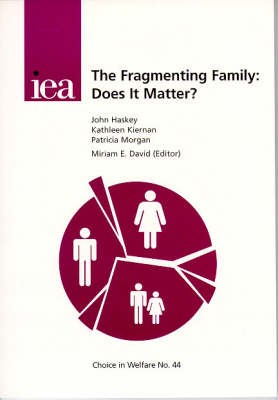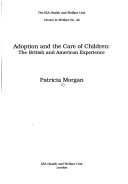Choice in Welfare S.
2 total works
No. 44.
The Fragmenting Family
by John Haskey, Kathleen E. Kiernan, and Patricia M. Morgan
Published 1 June 1998
The fate of the family is high on the public policy agenda. There are fewer marriages and more divorces; fewer births but a higher proportion outside marriage; more cohabitation and more people living alone. So is the family declining or just changing? And what do we mean by 'family' anyway? In the first part of this book John Haskey, the distinguished and widely-respected head of the Social Statistics Unit within the Demography and Health Division of the Office for National Statistics, sets out the facts. The changes which are occurring in family life are of unprecedented magnitude and speed. The 'traditional' family, headed by a married couple, is still in the majority, but it is a shrinking majority and, because the movement away from marriage is most noticeable in younger age-groups, we can expect the process of change to intensify in the short-term. Under the editorship of Miriam David, Professor and Dean of Research at the London Institute, two respected commentators examine the raw data from their different perspectives.
Kathleen Kiernan, a co-director of the ESRC Centre for the Analysis of Social Exclusion (CASE) at the London School of Economics and Political Science, argues for family policies which are based on the recognition of parenthood rather than marriage. Patricia Morgan, Senior Research Fellow in the family at CIVITAS, asks whether any culture can survive the disintegration of the central institution which transmits the values which hold it together. "Fragmentation of traditional British family life is graphically illustrated in an analysis of social trends by John Haskey, of the Office of National Statistics." The Daily Telegraph. "Morgan...argues that we should not accept the disintegration of the husband-wife family as the central way of raising children, but instead should seek to reverse it. Her concern is that the collapse of the married-couple family as the normal means of rearing children may threaten the cohesion of society." Community Care.
"Morgan's analysis of the 'inescapable data', showing the advantages of marriage and stable family life as well as the 'looking-glass logic' which inverts them, stands as a robust corrective to the irrationality, ideology and ignorance which now pass for debate on the family." Times Literary Supplement. "Patricia Morgan warns: 'What we are witnessing now is not the formalisation of other "family structures", but deregulation of the conjugal nuclear family which we have known for centuries.'" The Guardian.
Kathleen Kiernan, a co-director of the ESRC Centre for the Analysis of Social Exclusion (CASE) at the London School of Economics and Political Science, argues for family policies which are based on the recognition of parenthood rather than marriage. Patricia Morgan, Senior Research Fellow in the family at CIVITAS, asks whether any culture can survive the disintegration of the central institution which transmits the values which hold it together. "Fragmentation of traditional British family life is graphically illustrated in an analysis of social trends by John Haskey, of the Office of National Statistics." The Daily Telegraph. "Morgan...argues that we should not accept the disintegration of the husband-wife family as the central way of raising children, but instead should seek to reverse it. Her concern is that the collapse of the married-couple family as the normal means of rearing children may threaten the cohesion of society." Community Care.
"Morgan's analysis of the 'inescapable data', showing the advantages of marriage and stable family life as well as the 'looking-glass logic' which inverts them, stands as a robust corrective to the irrationality, ideology and ignorance which now pass for debate on the family." Times Literary Supplement. "Patricia Morgan warns: 'What we are witnessing now is not the formalisation of other "family structures", but deregulation of the conjugal nuclear family which we have known for centuries.'" The Guardian.
No. 42.
Adoption is out of favour. Numbers have fallen dramatically, and baby adoptions have become rare events. Recent trends in family law make it increasingly unlikely that children will ever be declared free to be adopted, while would-be adopters are discouraged by a series of obstacles and abjections. Consequently children who are unable to live with their natural parents are likely to spend long periods - possibly their entire childhoods - 'in care'. This can entail years of to-ing and fro-ing between children's homes, foster parents, and repeated attempts to re-unite them with neglectful and often abusive parents. The results for the children concerned are extremely poor, and all the evidence suggests that the state makes a very bad substitute parent. Children who have spent time 'in care' are more prone to psychiatric disorders, they suffer in terms of education and health, and they often 'graduate' from the system to homelessness, unemployment and prison. The results for adopted children, on the other hand, are extremely good. They do well by all measures.
When they experience problems, these often relate to their early childhood trauma at the hands of their natural parents, or to long periods spent 'in care' prior to adoption. In this book Patricia Morgan argues that childcare legislation and practice should be re-organised so that adoption becomes the first, not the last, option for children who cannot live with their parents. A child welfare system for the twenty-first century should be built around finding a permanent home for every child.
When they experience problems, these often relate to their early childhood trauma at the hands of their natural parents, or to long periods spent 'in care' prior to adoption. In this book Patricia Morgan argues that childcare legislation and practice should be re-organised so that adoption becomes the first, not the last, option for children who cannot live with their parents. A child welfare system for the twenty-first century should be built around finding a permanent home for every child.

